Polydesmida: Dalodesmidae: Tasmaniosoma
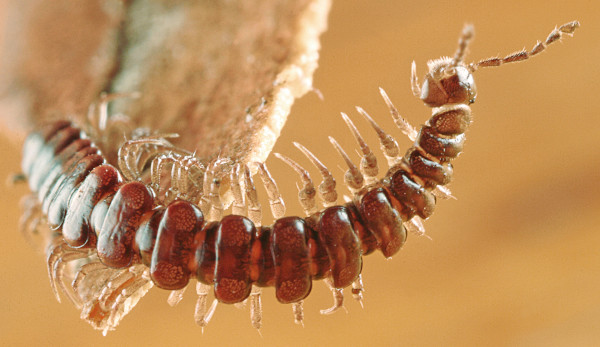
Tasmaniosoma armatum Verhoeff, 1936; image by Hans Hendrickx
Tasmaniosoma is currently the largest genus of Tasmanian Polydesmida, with 22 named, endemic, H+19 species. There are at least two rare, undescribed species in the northeast.
Several Tasmaniosoma species have handsome colour patterns when alive (see below), but very little colour after preservation in alcohol. Others, like T. armatum (see above), are uniformly reddish with persistent colour. A number of Tasmaniosoma species have three transverse rows of dome-like bumps on their tergites (see below).

Freshly preserved Tasmaniosoma clarksonorum Mesibov, 2010
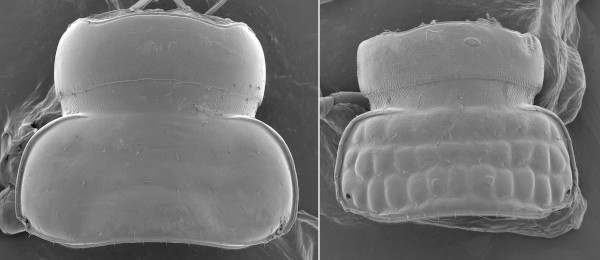
SEM views of midbody tergites of Tasmaniosoma warra (left, with smooth surface) and T. barbatulum (right, with three transverse rows of bumps).
The largest Tasmaniosoma species are ca 18 mm long as adults. They are found in loose litter and under tree bark, and almost never in the soil or in rotting logs. They have a distinct preference for eucalypt forest, woodland and scrub. As with other Tasmanian dalodesmids, Tasmaniosoma species can only be positively identified by closely examining the gonopods of mature males.
The armatum group: Uniformly reddish-brown species with smooth tergites.
Tasmaniosoma alces Mesibov, 2010
Males up to ca 15 mm long. Note the remarkable fishtail-shaped 'wings' on the gonopods. Only known from a small area on the southern East Coast.
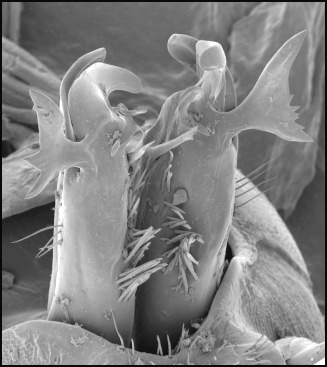
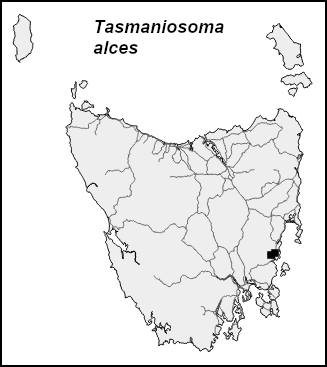
Tasmaniosoma armatum Verhoeff, 1936
Males up to ca 15 mm long (see image at top of page). Look for two Y-shaped processes on each gonopod. Defensive secretion contains benzaldehyde. Very common in eastern Tasmania, and possibly introduced in a few places outside its natural range. Tightly parapatric with T. orientale in the northeast.
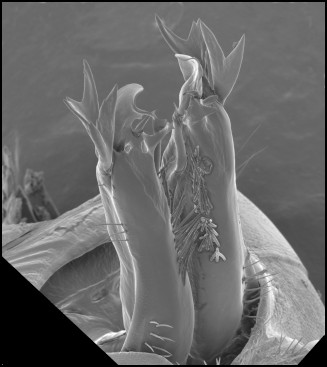
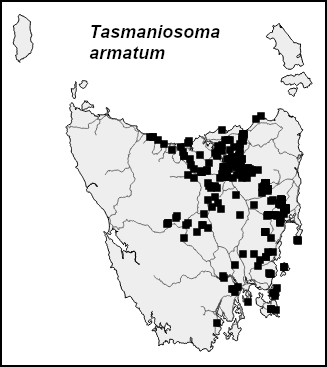
Tasmaniosoma maria Mesibov, 2010
Males ca 15 mm long. Known only from Maria Island.
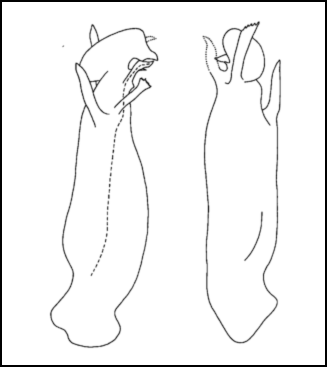
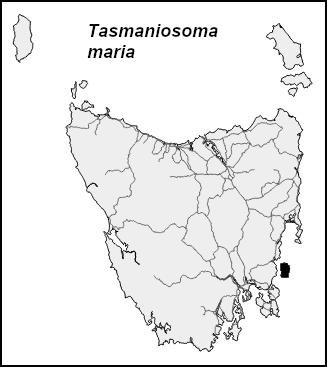
Medial (left) and anterolateral (right) views of left gonopod
Tasmaniosoma orientale Mesibov, 2010
Males ca 16 mm long. The long lateral branch of the gonopod is sometimes straight at the tip, rather than forked. Common in the northern part of the East Coast and Eastern Tiers, tightly parapatric with T. armatum.
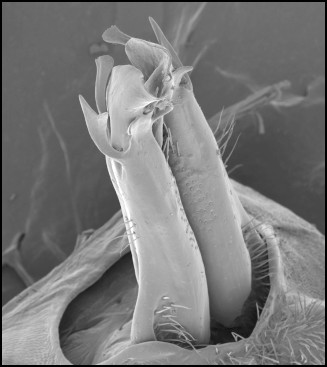
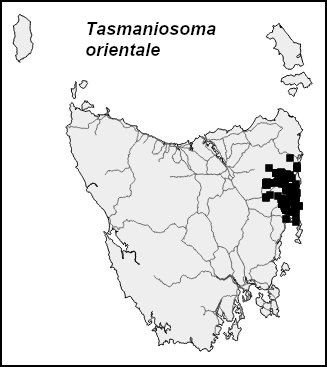
Tasmaniosoma warra Mesibov, 2010
Males ca 16 mm long. Common in wet forest in the Huon district; also found on South Bruny Island.
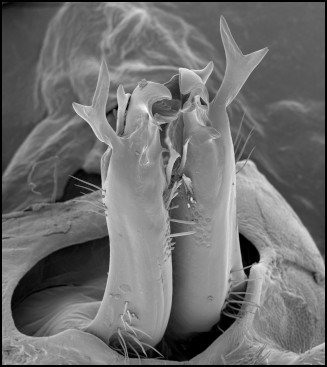
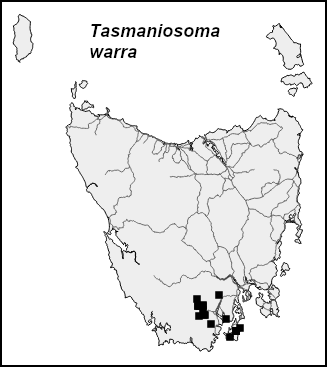
The anubis group: Species in this group have complex colouration that fades in alcohol, three rows of low, rounded, metatergal tubercles and a gonopod with two or three tight clusters of stout, rod-like setae at or near the tip.
Tasmaniosoma anubis Mesibov, 2015
Males ca 10 mm long, light greenish-brown. Eucalypt forest and woodland within the city of Launceston; abundant in Trevallyn Nature Recreation Area.
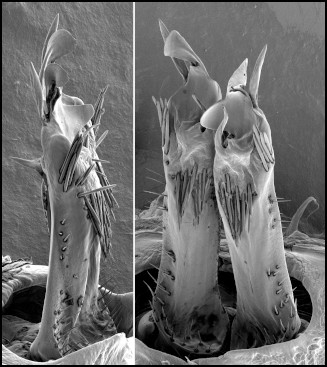
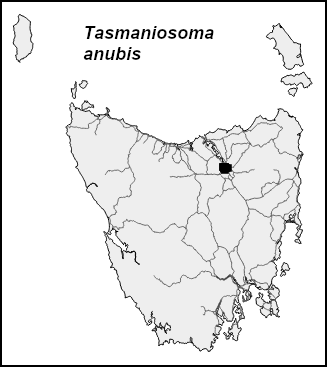
Tasmaniosoma barbatulum Mesibov, 2010
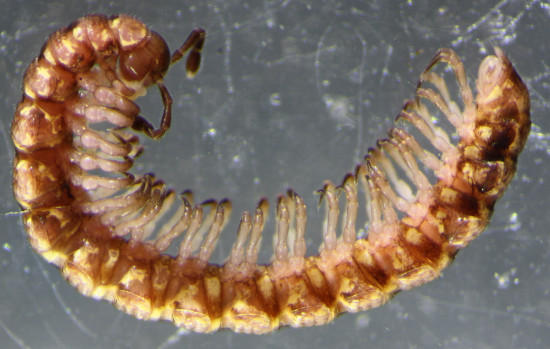
Males ca 10 mm long, reddish brown with yellow mottling. Known from Scamander to St Marys on the northern East Coast, and inland in the Fingal Valley.
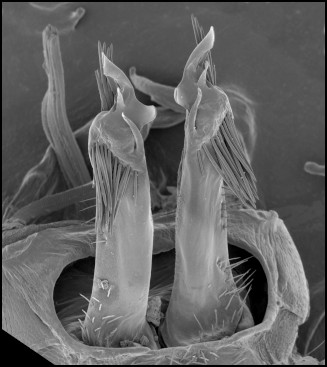
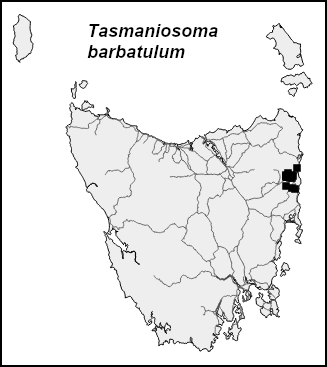
Tasmaniosoma clarksonorum Mesibov, 2010
Males ca 11 mm long (see image at top of page). Common in wet forest in the northeast.
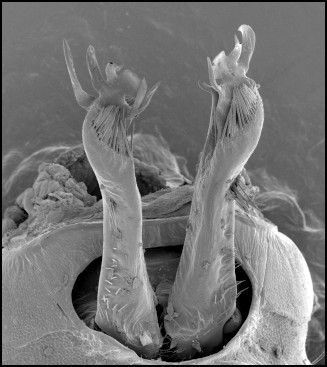
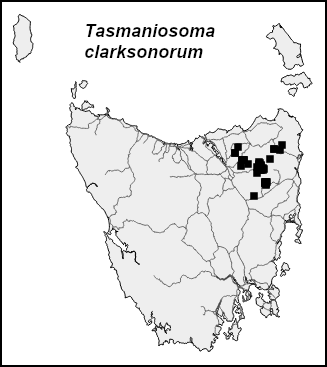
Tasmaniosoma compitale Mesibov, 2010
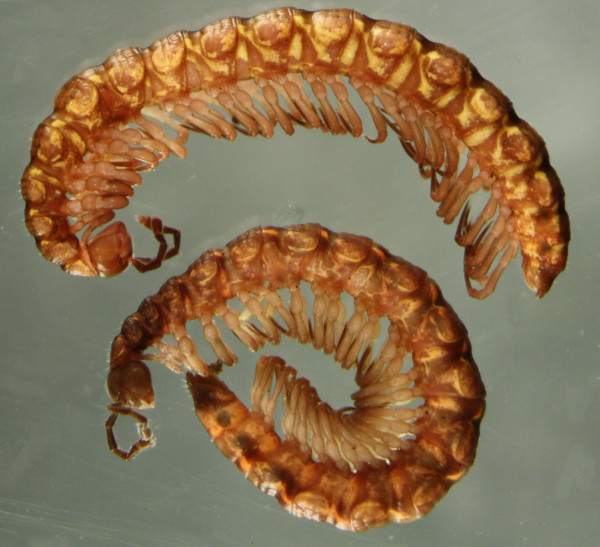
Tasmaniosoma compitale (top), T. hickmanorum (bottom)
Males to ca 15 mm long. Common in the far northwest, tightly parapatric with T. hickmanorum.
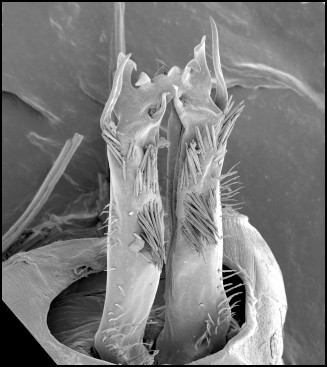
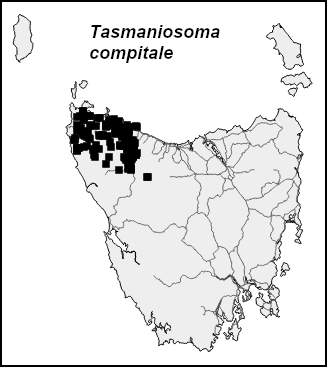
Tasmaniosoma fasciculum Mesibov, 2010
Males ca 11 mm long, reddish paranota when live, fading to pale brown in alcohol. Uncommon in north central Tasmania.
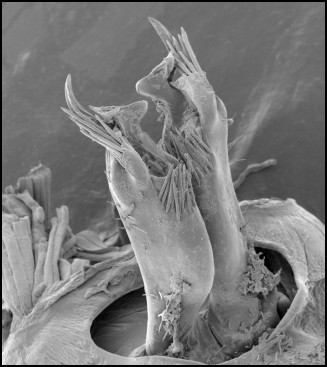
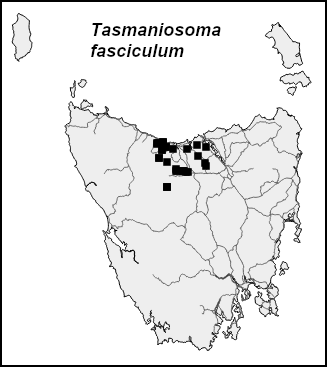
Tasmaniosoma fragile Mesibov, 2010
Males ca 12 mm long, medium brown with yellow on underside. Central East Coast and the Eastern Tiers.
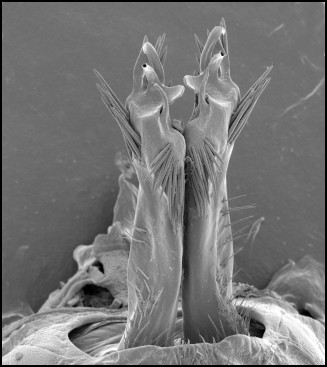
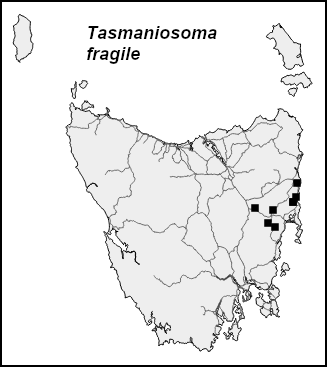
Tasmaniosoma hickmanorum Mesibov, 2010
Males to ca 16 mm long, reddish brown (see image above). Common in western Tasmania but replaced by (and tightly parapatric with) T. compitale in part of the northwest.
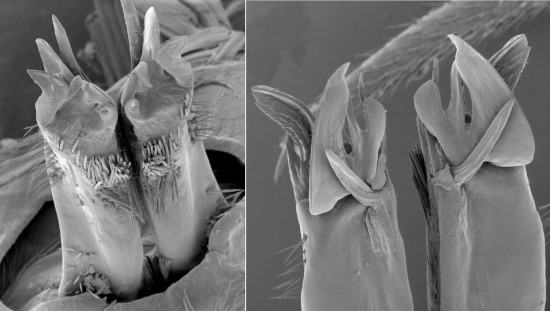
Gonopods in posterior (left) and anterior (right) views
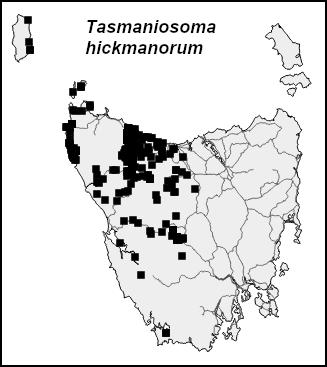
Tasmaniosoma nicolaus Mesibov, 2015
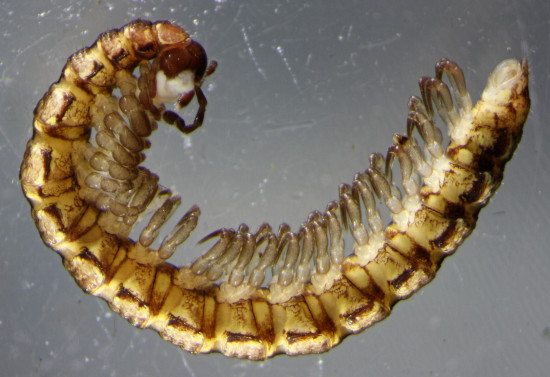
Males ca 11 mm long, yellowish with darker paranotal margins. Eucalypt forest in the Nicholas Range and on Mt Elephant at the eastern end of the Fingal Valley.
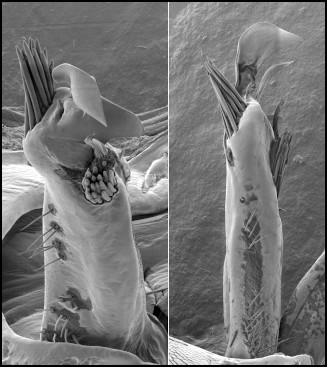
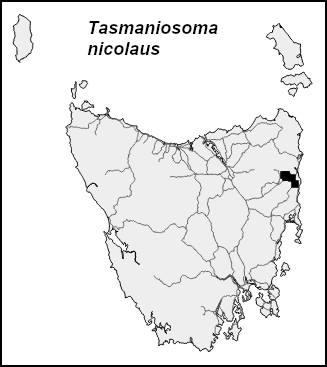
Posteroventral (left) and lateral (right) views of right gonopod
australe and bruniense: tergites smooth; the solenomere (gonopod branch carrying the sperm channel) is broad, flattened and on the outside of the gonopod apex; mature females have a swelling on the far end of the leg 2 prefemur.
Tasmaniosoma australe Mesibov, 2010
Males ca 18 mm long, uniformly medium brown. Inland south central Tasmania from Maydena to Southport.
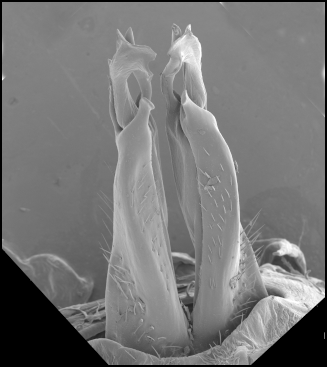
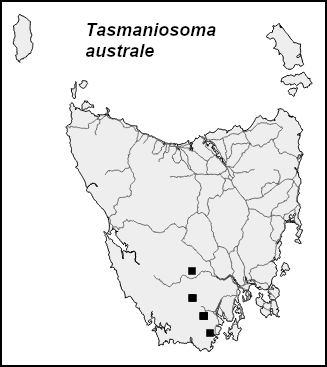
Tasmaniosoma bruniense Mesibov, 2010
Males ca 14 mm long, dark brown with small pale patches on paranota. Only known from South Bruny Island.
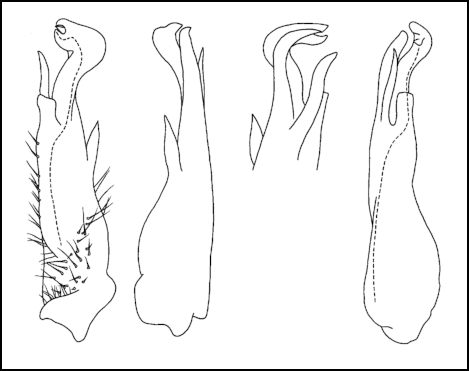
Left to right: lateral, anterior, medial and posterior views of left gonopod
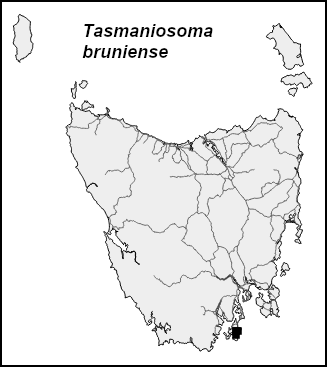
hesperium and laccobium: tergites smooth, live colour not yet known; gonopods with a particular arrangement of 4 branches at the tip
Tasmaniosoma hesperium Mesibov, 2010
Males ca 12 mm long. So far known only from two sites in the Southwest.
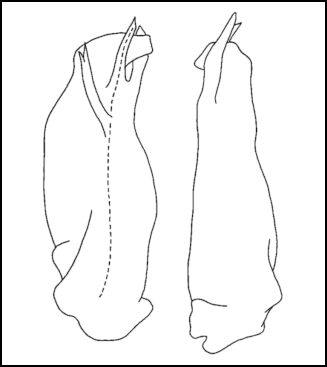
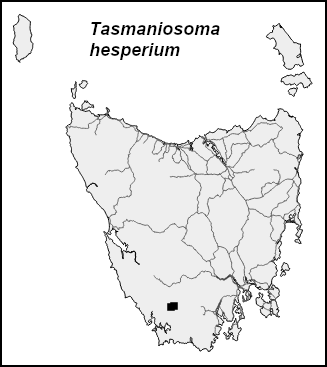
Medial (left) and posterior (right) views of left gonopod
Tasmaniosoma laccobium Mesibov, 2010
Males ca 12 mm long. So far known only from Lake Sydney in the southern mountains.
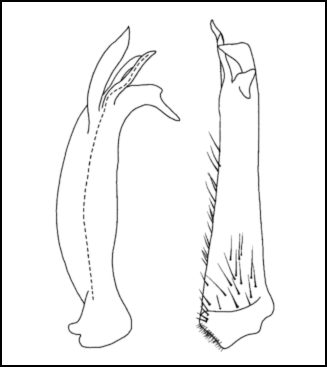
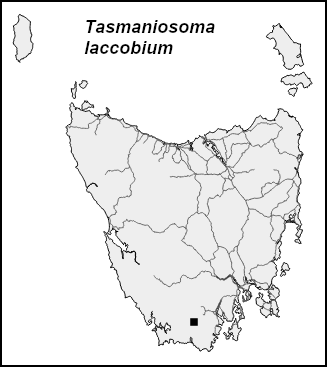
Medial (left) and posterior (right) views of left gonopod
decussatum and gerdiorivum: tergites with 3 rows of very low bumps; the solenomere (gonopod branch carrying the sperm channel) is broad, flattened and on the inside of the gonopod apex; gonopods with peculiar "shelf" at base (hard to see).
Tasmaniosoma decussatum Mesibov, 2010
Males ca 11 mm long. Live colour not known, but long-preserved animals pale with reddish speckling. Common in wet forest in the eastern part of the northeast.
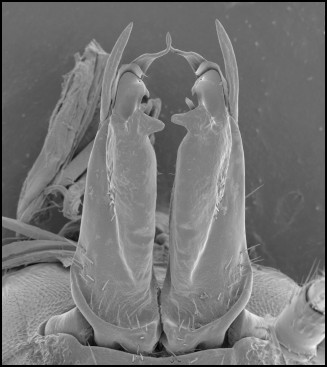
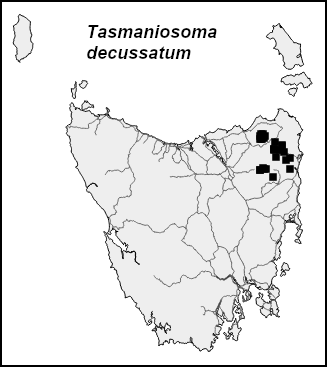
Tasmaniosoma gerdiorivum Mesibov, 2010
Males ca 10 mm long, pale yellow-brown with reddish mottling. Common in wet forest in the western part of the northeast, with one disjunct record from north central Tasmania.
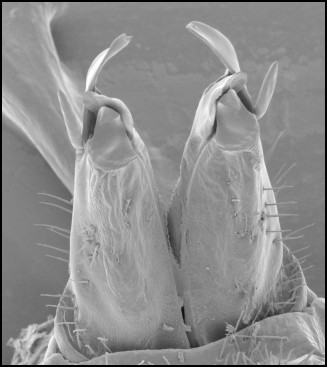
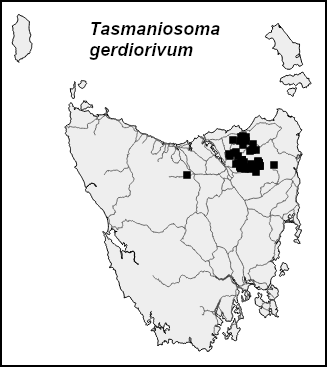
Miscellany: Species not obviously related to other Tasmaniosoma.
Tasmaniosoma aureorivum Mesibov, 2010
Males ca 13 mm long. Live colour not yet known, tergites smooth. Apparently rare in south central Tasmania, near Maydena.
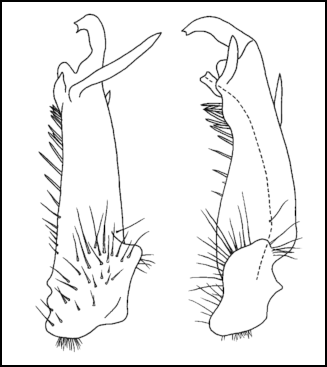
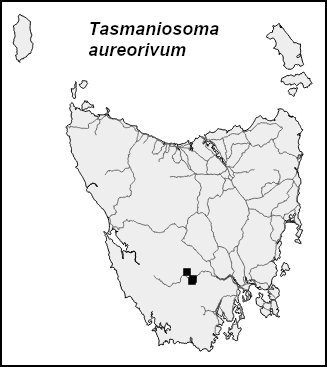
Posterior (left) and lateral (right) views of left gonopod
Tasmaniosoma cacofonix Mesibov, 2010
Males ca 14 mm long, pale greenish yellow with red speckling towards rear on each tergite, tergites smooth. Common in dry forest, woodland and heath in the eastern part of the northeast.
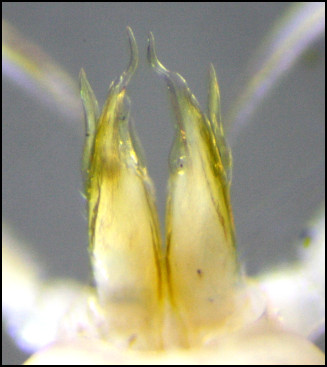
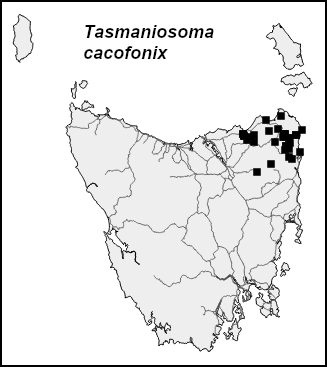
Tasmaniosoma interfluminum Mesibov, 2015
Males ca 11 mm long, yellowish with red-brown speckling. Eucalypt forest north and east of Fingal, with an outlying record near Scamander.
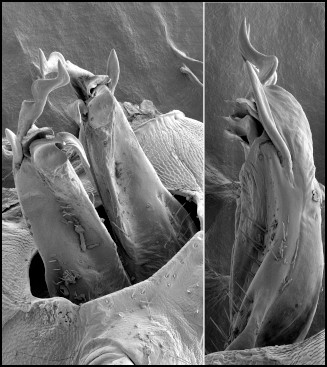
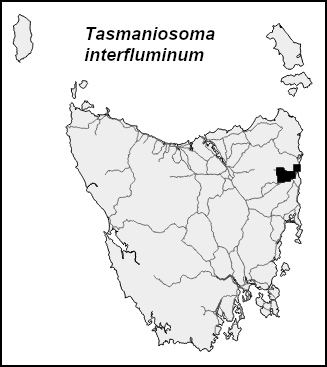
Posterior view of gonopods (left), lateral view of left gonopod (right)
